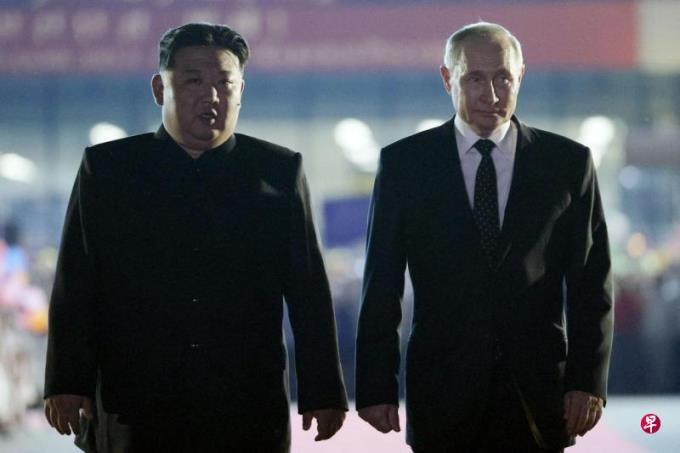
On October 24, the Treaty of Russia and North Korea was approved by Russia's Duma, which was generally interpreted as the establishment of a military alliance between the two countries.At the same time, the recent reports of the Korean National Intelligence Institute and international media have continuously reported that North Korea has sent more than 10,000 soldiers to Russia. It is expected that after training, it is expected to invest in Russia and Ukraine.South Korea responded strongly, and the Ministry of Foreign Affairs of South Korea summoned the Russian ambassador to South Korea to protest the North Korean army to help Russia.Earlier, North Korea claimed that it was fully closed by the highway and railway section of China -Korea and South Korea by blasting. The South Korean military fired a warning after blowing the above -mentioned work in North Korea.At the Supreme People's Conference on January 15, North Korean leader Kim Jong -un suggested that in the constitution, South Korea defines South Korea as the "number one enemy country" and "forever the main enemy".On October 21, South Korean President Yin Xiyue and NATO Secretary -General Rute said that he would further strengthen South Korea -Ukraine -NATO security cooperation.
International analysis highly focuses on the impact of incidents on China. There are two main views: the first is that the approach of the military and Russia's military will lead to "marginalization theory" on the Korean Peninsula;It will allow the United States, Japan and South Korea to move towards the three -sided alliances, and form the "New Cold War" pattern of South Korea, the United States, Japan, and Russia, Russia, Russia, and China.The author believes that the approach of North Korea and Russia is indeed a major geographical strategic dynamics, but the above views have overestimated the strategic pressure on China and the structural impact on the security of Northeast Asia.
First of all, Russia is not the core stakeholder of the Korean Peninsula. The influence of Russia on the Peninsula issue must be realized through the strategic cooperation and multilateral dialogue mechanism of China -Russia.From a historical point of view, from 1950 to 1953, Russia did not directly participate in the war, did not participate in the suspension negotiations, nor was it the signature party of the Korean War Counterfeit Agreement.North Korea, China and the United States are the signatures of the Korean War.This means that the core stakeholders on the peninsula issue are China and the United States.In the 1990s, the Quartet talks on the Korean Peninsula issue were North Korea, South Korea, China and the United States.
At the beginning of the 21st century, after the establishment of the six -party talks in China, Russia and Japan were invited to join.In April 2018, the joint statement issued by the North Korean leader Panmunnia Store Summit also proposed to end the Korean War, agree to explore the talks of the North Korea, South Korea, South Korea, and the United States.Peace mechanism.The strategic interests of Russia on the Korean Peninsula issue, in addition to in Northeast Asia itself, also have considerations for European security.Russia's strategic focus is always in Europe, but the security issues of Eurasia have affected each other.
On the issue of Ukraine, Russia believes that the serious imbalance of the European security structure after the Cold War caused a security crisis and conflict.Therefore, the efforts to build a balanced, inclusive and sustainable security structure in Northeast Asia will help strengthen Russia's claims in European security.On the day when Russian President Putin visited North Korea, in an article published in labor news, it clearly stated that it was necessary to "build an equal and inseparable security structure in Eurasia."
Russia actively supports China's claims and proposals on the Peninsula issue.For example, on July 4, 2017, foreign ministers of China and Russia issued a joint statement on the Korean Peninsula on Moscow. The two sides used China to suspend nuclear guidance on North Korea and suspend the large -scale joint military exercise "dual -pause" initiative with the United States and South Korea to achieve North Korea.The "dual -track parallel" idea of the peninsula has been nucleized and the establishment of a peace mechanism for the establishment of a peninsula, and the Russian side proposes a common initiative on the basis of the Russian Peninsula problem.In May this year, Putin visited China, and the joint statement issued by the two parties once again called on the international community to support the joint initiative of China -Russia.
Article 4 of the New Treaty of the North Korea and Russia stipulates that "according to Article 51 of the United Nations Charter and the laws of the North Korean Democratic People's Republic and the Russian Federation, it immediately provides military and other aids."The prerequisite, so it cannot be regarded as a complete military alliance.
Second, the future of the security structure of Northeast Asia will coexist in peace with the "two countries", rather than "unified".North Korea defines South Korea as the number one enemy country and other words and deeds. It looks quite fierce. Some people even think that it is irrational. However, looking back at history, the conservatives of the United States and South Korea have always defined North Korea as the number one enemy after the Cold War.In the 1990s, conservatives in the United States and South Korea held themselves with the Cold War.After the outbreak of the Nuclear Nuclear crisis, the basic policy of the United States and South Korea's North Korea is "North Korea's theory of collapse" and "He Ping Dews". The main means are military deterrence to allow North Korea to abandon the nuclear weapon missile plan and put pressure on human rights democracy to change the regime on the issue of human rights and democracy to change the regimeThis is essentially to promote the change of regime when North Korea abandoned defense.From the perspective of the United States and South Korea, after the Cold War, North Korea lost Sino -Russian assistance, and it was only a matter of time, or at least it would evolve in East Germany by the West Germany. The nuclear issue would be solved in the process of North Korea collapse and South Korea's unified North Korea.The conservatives in the United States and South Korea lack the motivation to dialogue on nuclear issues.
If the "North Korea collapse theory" is the United States and South Korea replaced reality with their own hope, the "East German model theory" uses inappropriate analogy.Although East and West Germany had tight relations in the Cold War, there were still many economic and social exchanges, which had not occurred between North Korea and South Korea.North Korea still has long been away from the international economic system after the Cold War. It has a low proportion of foreign trade in the economy and has a strong ability to resist pressure.Despite the improvement of North Korea -US relations during the Trump era, it did not continue.With the conservatives of Biden and South Korea's conservatives, military deterrence has been upgraded, economic sanctions have increased, and ideological attacks have intensified.However, history has proven that it will be successful in the future of Northeast Asia with the North Korean collapse as the starting point of the policy and will not succeed.
After North Korea, after the Cold War, it essentially followed the development path of globalization and regionalization. This direction will not change in the short term.Because this national directional change requires two basic conditions: the first is that the North Korean leadership is reassuring about opening up, but the economic gap between North Korea and South Korea, especially the hostile layer of the United States and South Korea, is impossible to achieve; the second is the United States.Economic sanctions with allies will not stop, and North Korea will not abandon the nuclear.But with the continuous consumption war of coexistence, the United States, Japan and South Korea will eventually have to accept the reality of "isolated North Korea" to continue to survive.Northeast Asia's security architecture will also be rebuilt on the basis of finding a peaceful coexistence in North Korea.This is a long and risky process. How to realize the transformation of controllable tensions requires the wisdom of all parties.



